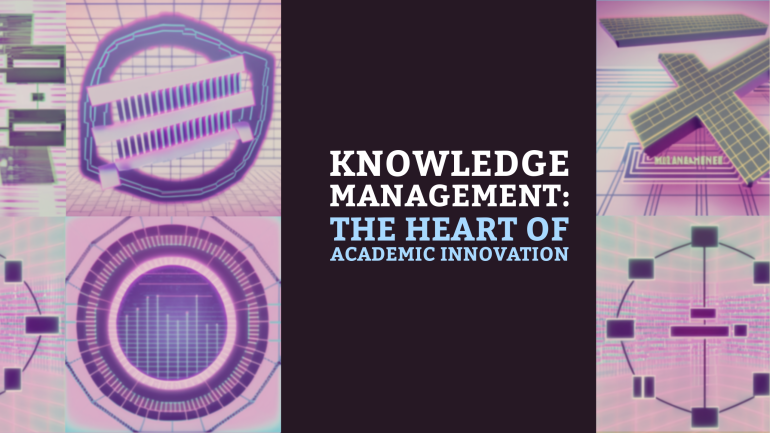This website uses cookies so that we can provide you with the best user experience possible. Cookie information is stored in your browser and performs functions such as recognising you when you return to our website and helping our team to understand which sections of the website you find most interesting and useful.
Table of Contents
TL;DR: Empowering Academic Innovation Through Knowledge Management
- Knowledge Management is Essential: Knowledge management is crucial for academic institutions to innovate and excel in research and teaching.
- Efficient Sharing of Knowledge: Implementing knowledge management systems facilitates the sharing of information and expertise across departments and individuals.
- Enhanced Collaboration: Knowledge management tools enable collaboration among academics, leading to the development of groundbreaking ideas and projects.
- Improvement in Decision-Making: Access to organized knowledge through effective knowledge management practices enables better decision-making processes within academic institutions.
- Promotes Continuous Learning: By managing knowledge effectively, academic institutions can foster a culture of continuous learning and growth among faculty and students.
You may wonder, what drives academic institutions to stay at the forefront of innovation and progress? The answer lies in knowledge management, a pivotal strategy that serves as the lifeblood of academic innovation. In today’s rapidly evolving educational landscape, knowledge management plays a crucial role in harnessing and leveraging the wealth of information available to academic institutions.
By implementing knowledge management practices, universities and colleges can effectively capture, share, and utilize valuable insights and expertise to drive positive changes and advancements in various fields. However, overlooking the importance of knowledge management can lead to dangerous consequences, hindering the growth and development of academic institutions. Stay tuned as we investigate deeper into the world of knowledge management and its impact on academic innovation.
The Foundations of Knowledge Management
Historical Context and Evolution
You cannot discuss knowledge management without understanding its historical context and evolution. Knowledge management as a discipline emerged in the late 20th century in response to the increasing recognition of knowledge as a valuable organizational asset. Organizations began to realize that effectively managing their knowledge resources could significantly impact their competitive advantage and innovation capabilities. As technology advanced, knowledge management practices evolved to encompass a wide range of tools and strategies aimed at capturing, storing, sharing, and utilizing knowledge within organizations.
Major Theories and Models
Historically, knowledge management has been influenced by various theories and models that have shaped the way organizations approach knowledge creation and sharing. Some of the major theories include Nonaka and Takeuchi’s SECI model, which outlines the processes of socialization, externalization, combination, and internalization in knowledge creation. Other prominent models include Polanyi’s theory of tacit knowledge and Davenport and Prusak’s knowledge management framework.
Management of knowledge within organizations is crucial for fostering innovation and driving growth. It involves creating a culture that values and promotes knowledge sharing, implementing technological solutions for storing and accessing knowledge, and developing practices for capturing and transferring knowledge from experts to novices. Effective knowledge management can lead to improved decision-making, increased efficiency, and enhanced collaboration among employees, ultimately contributing to the organization’s success in a competitive marketplace.
Strategies for Effective Knowledge Management in Academia
Capturing Tacit Knowledge
Now, in Academia, capturing tacit knowledge is important for effective knowledge management. This type of knowledge is often unspoken and more challenging to document compared to explicit knowledge. To capture tacit knowledge, academic institutions can encourage regular interactions among faculty members, encourage mentorship programs, and create platforms for informal knowledge sharing. By recognizing the value of tacit knowledge and implementing strategies to capture it, academia can harness a wealth of expertise and insights that might otherwise be lost.
Leveraging Technology and Tools
Effective utilization of technology and tools is paramount in managing knowledge efficiently in academia. Leveraging knowledge management systems, data analytics tools, and collaboration platforms can streamline information sharing, facilitate collaboration among researchers, and enhance decision-making processes. By investing in the right technologies and providing training to staff and faculty, academic institutions can create a robust knowledge management infrastructure that supports innovation and research excellence.
To further enhance knowledge management through technology, academic institutions can implement artificial intelligence algorithms to analyze data and provide valuable insights, automate routine tasks, and improve the accuracy and efficiency of research processes. By integrating technology into knowledge management practices, academia can stay at the forefront of innovation and research advancements.
Networking and Collaborations
To foster a culture of knowledge sharing and collaboration, academia must prioritize networking and partnerships both within and outside the institution. Collaborating with industry partners, other academic institutions, government agencies, and international organizations can bring diverse perspectives, resources, and expertise to academic research projects. By establishing strong networks and collaborations, academia can accelerate the dissemination of knowledge, drive interdisciplinary research, and address complex global challenges.
This collaborative approach not only enriches academic research but also creates opportunities for faculty and students to engage in real-world projects, gain practical experience, and broaden their professional network. By actively participating in networking events, conferences, and collaborative initiatives, academic institutions can strengthen their knowledge management practices and cultivate a culture of continuous learning and innovation.
Role of Leadership in Fostering a Knowledge-rich Culture
Not only does leadership play a pivotal role in shaping organizational culture, but it is also instrumental in fostering a knowledge-rich environment within academia. Effective leaders serve as role models, setting the tone for knowledge sharing, collaboration, and continuous learning among faculty members, researchers, and students.
Leadership Styles and Knowledge Sharing
Any organization’s success in knowledge management is heavily influenced by the leadership styles employed within the academic institution. Leaders who embrace a transformational leadership style, which emphasizes inspiring and empowering others, are more likely to foster a culture of openness, innovation, and information sharing. On the other hand, autocratic leadership styles may stifle knowledge sharing and discourage collaboration among team members.
Incentivization and Recognition Programs
Knowledge management is not only about creating systems and processes for storing and sharing information; it also involves motivating individuals to actively participate in knowledge sharing activities. Incentivization and recognition programs are imperative tools for encouraging a culture of knowledge sharing within an academic setting. By rewarding individuals for their contributions to knowledge creation and dissemination, organizations can reinforce the value of sharing information and expertise.
Culture plays a crucial role in shaping attitudes and behaviors related to knowledge management. Leaders must work towards nurturing a culture where knowledge sharing is not only encouraged but also celebrated. By embedding knowledge sharing practices into the fabric of the academic institution, leaders can create an environment where learning and innovation thrive, ultimately driving academic innovation forward.
Learning and Teaching Innovations through Knowledge Management
Curriculum Development and Flexibility
Keeping pace with the rapidly evolving educational landscape requires a shift towards more agile curriculum development processes. By leveraging knowledge management principles, academic institutions can create flexible and dynamic curricula that adapt to the needs of students and industry trends. Innovations in curriculum development include the utilization of knowledge repositories, collaborative platforms, and feedback loops to continuously enhance the learning experience.
Active Learning and Peer-to-Peer Education Strategies
Strategies that promote active learning and peer-to-peer education have gained traction in modern educational settings. These Innovations leverage knowledge management systems to facilitate collaborative learning environments, where students take on more active roles in their education. By incorporating technology tools and interactive platforms, educators can create engaging learning experiences that foster critical thinking and problem-solving skills.
Education efforts focused on active learning and peer-to-peer education strategies are necessary for preparing students for the demands of the 21st-century workforce. Encouraging collaboration, communication, and knowledge sharing among peers not only enhances academic performance but also cultivates valuable teamwork and leadership skills.
Research Development and Knowledge Dissemination
Promoting Interdisciplinary Research
Many academic institutions are recognizing the importance of promoting interdisciplinary research to foster collaboration across different disciplines. Knowledge sharing between researchers in various fields can lead to groundbreaking discoveries and innovative solutions to complex problems. By encouraging interdisciplinary research, academic institutions can drive academic innovation and create a more dynamic research environment.
Open Access and Knowledge Exchange Platforms
Interdisciplinary collaboration is further facilitated through open access and knowledge exchange platforms. These platforms provide researchers with the opportunity to share their findings openly with a wider audience, breaking down the barriers of traditional publishing models. Through open access platforms, researchers can access a wealth of information and collaborate more effectively across disciplines, ultimately accelerating the pace of scientific progress.
To stay at the forefront of academic innovation, it is crucial for researchers to embrace open access and knowledge exchange platforms. These platforms not only promote transparency and collaboration but also provide a means for researchers to reach a global audience, maximizing the impact of their research. By leveraging these platforms, researchers can harness the power of collective knowledge and drive innovation forward in an increasingly interconnected world.
Metrics and Evaluation of Knowledge Management Initiatives
Despite the immense value that knowledge management initiatives bring to academic institutions, it is crucial to establish metrics and evaluations to measure their effectiveness. Without proper measurement tools, it becomes challenging to determine the impact of these initiatives and make informed decisions about their future implementation.
Key Performance Indicators for Academic Knowledge Management
The development of key performance indicators (KPIs) is imperative in assessing the success of knowledge management initiatives in academic settings. KPIs can include metrics such as knowledge sharing rates, collaboration levels among faculty members, use of centralized knowledge repositories, and the incorporation of new knowledge into research and teaching activities. These indicators provide a quantitative measure of the impact of knowledge management practices on academic innovation and can guide institutions in enhancing their knowledge sharing cultures.
Continuous Improvement and Adaptation
Improvement and adaptation are fundamental aspects of sustaining effective knowledge management practices in academic environments. Continuous evaluation of KPIs and feedback from stakeholders help in identifying areas that need enhancement. Institutions can then implement changes to their knowledge management strategies to address any shortcomings and ensure that they remain relevant and impactful.
Knowledge management initiatives in academia must embrace a culture of continuous improvement to stay ahead in an ever-evolving educational landscape. By prioritizing data-driven evaluations and making necessary adaptations, academic institutions can foster a dynamic environment that nurtures innovation and knowledge creation.
Challenges and Future Directions
Addressing Intellectual Property Concerns
Directions: Unlike other industries, academia faces unique challenges when it comes to intellectual property concerns. With a heavy emphasis on collaboration and information sharing, protecting intellectual property rights can be a complex and delicate issue. However, by implementing clear policies and guidelines, academia can navigate this challenge effectively. Encouraging researchers to document their work, establish ownership rights, and consider licensing agreements can help protect intellectual property while fostering a culture of innovation.
Predicting and Preparing for Future Trends in Academic Knowledge Management
Predicting: One of the critical aspects of academic knowledge management is staying ahead of emerging trends and technological advancements. By predicting and preparing for future trends, academic institutions can position themselves as leaders in innovation. Embracing tools like artificial intelligence, data analytics, and cloud computing can enhance knowledge management practices, streamline processes, and improve collaboration among researchers.
Challenges:
As academia continues to evolve, challenges such as data security, information overload, and technological disruptions will require proactive strategies and solutions. However, by addressing these challenges head-on and leveraging the power of knowledge management, academic institutions can drive sustainable growth and foster a culture of continuous learning and innovation.
Final Words
Now, it is clear that knowledge management is indeed the heart of academic innovation. By effectively harnessing, sharing, and utilizing knowledge within academic institutions, innovation can flourish, leading to improved research outcomes, teaching methods, and overall success. Through the integration of knowledge management practices into everyday operations, academic institutions can stay at the forefront of advancements in their respective fields, ultimately contributing to the advancement of society as a whole.
As technology continues to evolve and the pace of information dissemination accelerates, the role of knowledge management in academic innovation will only become more vital. Embracing knowledge management principles and investing in the necessary tools and resources will be key for academic institutions looking to thrive in an increasingly competitive and dynamic environment. By recognizing the importance of knowledge as a strategic asset and implementing robust knowledge management strategies, academic institutions can truly unlock their full potential and drive innovation forward.
FAQ
Q: What is Knowledge Management?
A: Knowledge Management is the process of creating, sharing, using, and managing the knowledge and information of an organization to achieve its goals.
Q: How does Knowledge Management contribute to Academic Innovation?
A: Knowledge Management plays a crucial role in Academic Innovation by fostering collaboration, improving decision-making, and enhancing the learning process through effective management of information and knowledge resources.
Q: What are the key components of Knowledge Management in Academic Institutions?
A: The key components of Knowledge Management in Academic Institutions include knowledge creation, knowledge sharing, knowledge organization, and knowledge utilization to drive innovation and improvement.
Q: How can Academic Institutions implement Knowledge Management effectively?
A: Academic Institutions can implement Knowledge Management effectively by establishing a knowledge-sharing culture, utilizing technology for knowledge capture and dissemination, providing training on knowledge management practices, and fostering collaboration among faculty and students.
Q: What are the benefits of integrating Knowledge Management into Academic Innovation?
A: The benefits of integrating Knowledge Management into Academic Innovation include improved research outcomes, enhanced teaching methods, increased institutional efficiency, better decision-making processes, and a culture of continuous learning and improvement.





